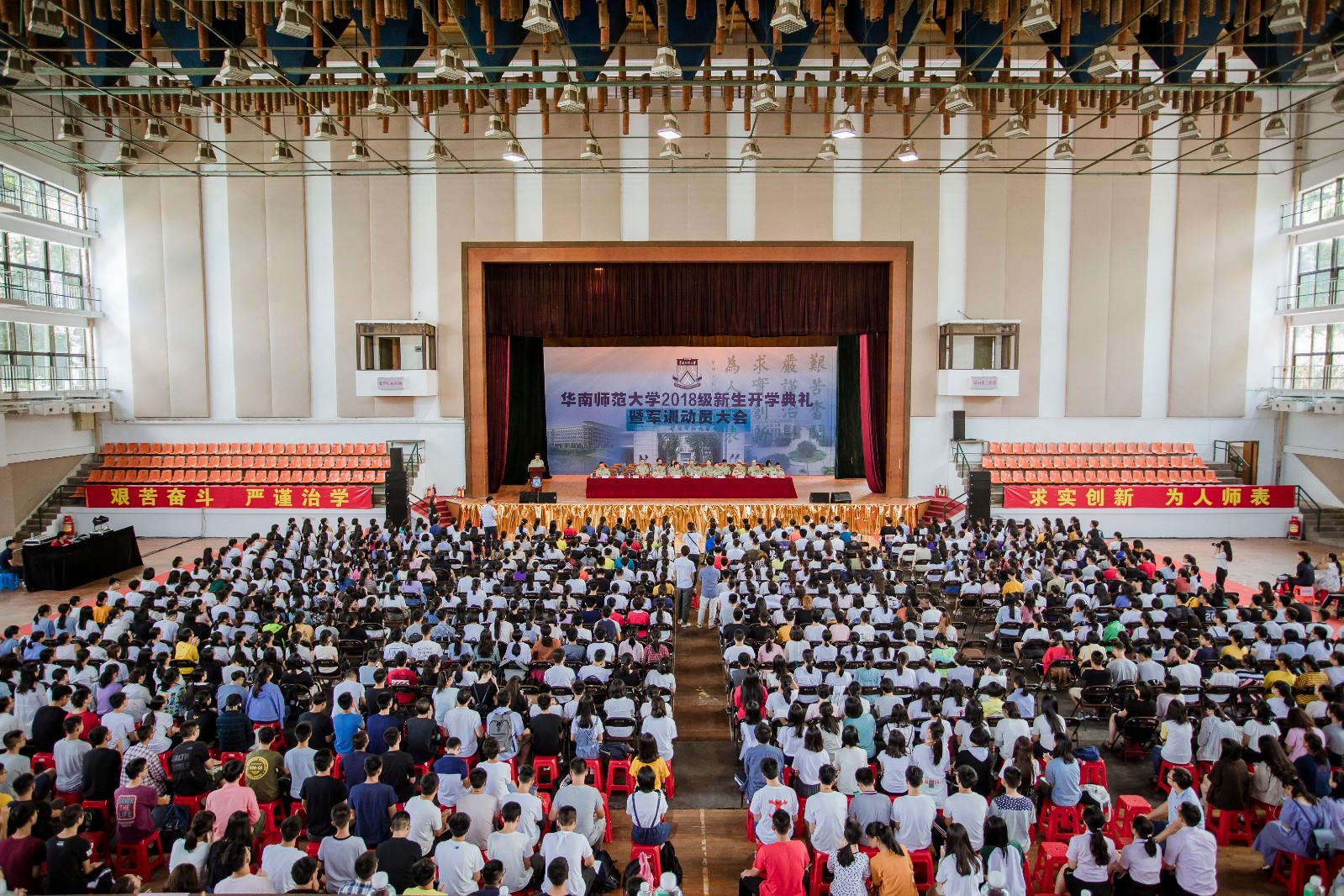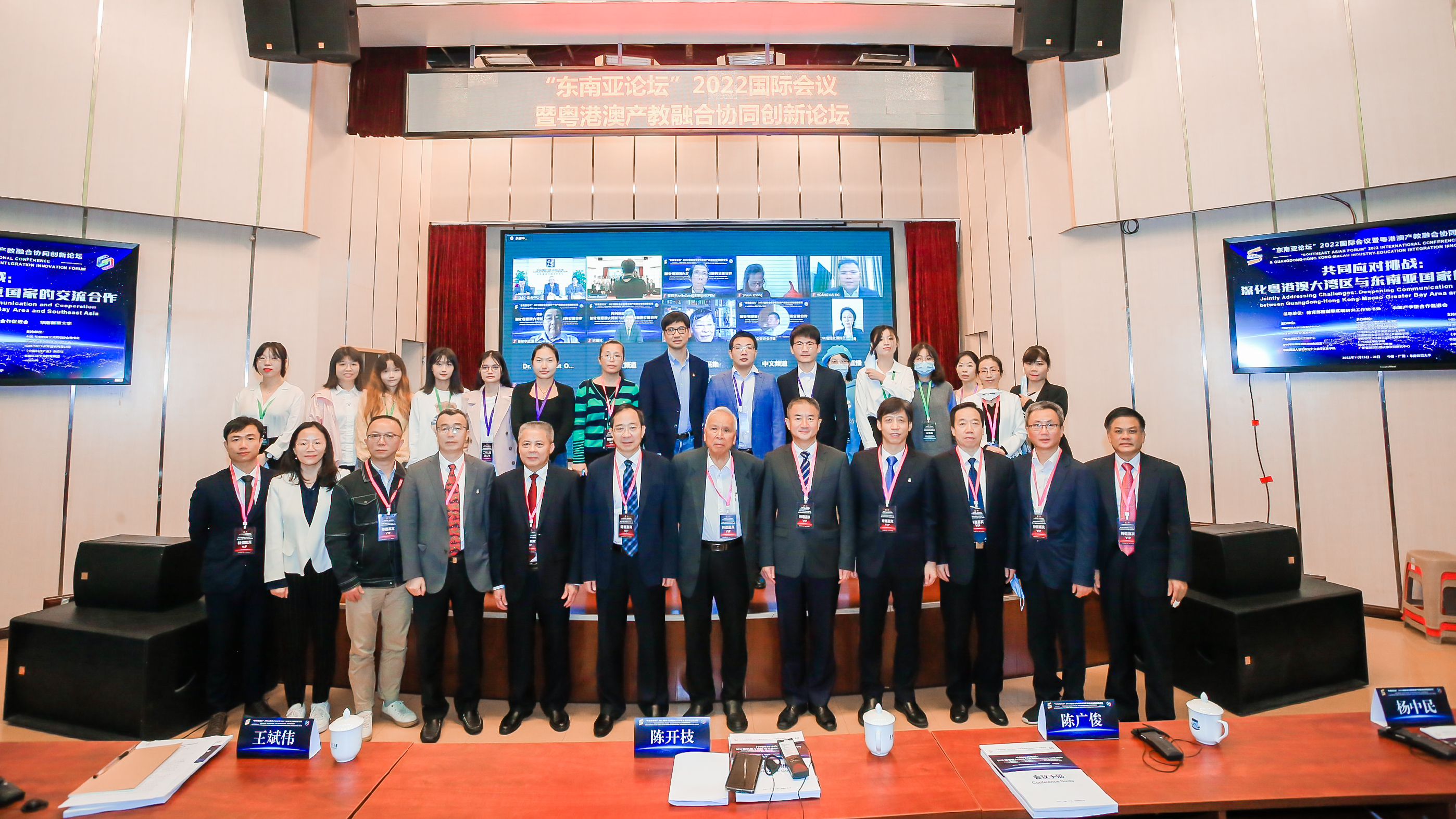
Likes
The "Southeast Asia Forum" of the 2022 Innovation Forum on integration of industry and education was held at SCNU, with the aim of promoting collaborative and innovative development between the Greater Bay Area (China) and various southeast Asian countries.

Group photo of the guests at the forum scene.
With the theme of "Facing challenges cooperatively: deepening exchange and cooperation between the Greater Bay Area (China) and Southeast Asian countries", the forum on integration of industry and education in the Greater Bay Area aims to discuss how to deepen the collaborative and innovative development in the region and optimize multilateral system based on regional and developmental advantages so as to cope with new challenges while facing global change, and to build a closer China-ASEAN community with a shared future.
According to Wang Binwei, secretary of the Party committee of SCNU, SCNU attaches great importance to international educational exchange and regional cooperation. SCNU has set up 8 overseas research bases in 7 southeast Asian countries and signed educational cooperation agreements with five universities in five countries in the region. Boasting a long history of research and practice in the the field of education in southeast Asia, SCNU will promote cultural exchange, setting up think tanks, decision-making and consulting services, academic cooperation, and scientific research with schools and organizations in the region.
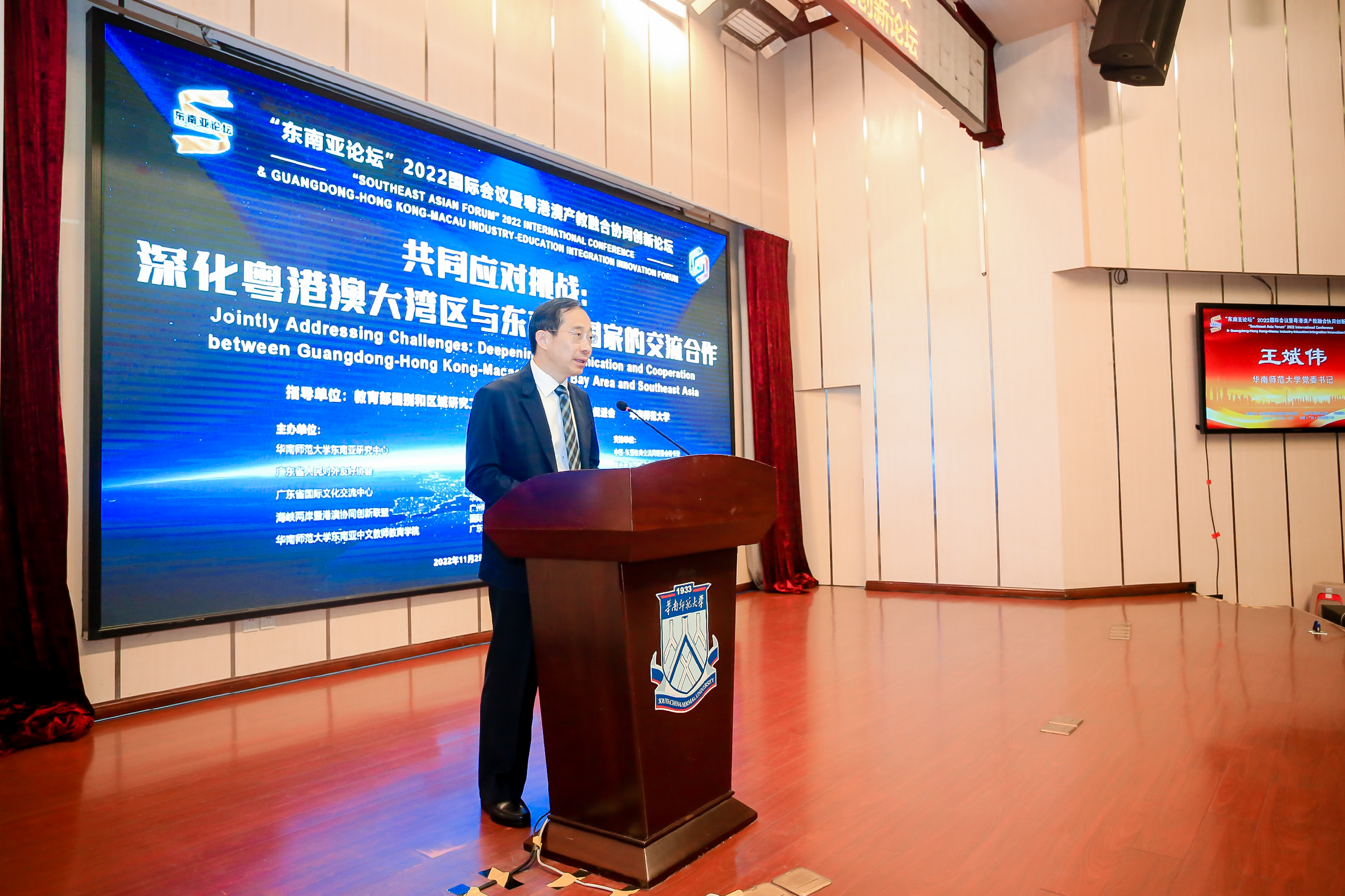
Wang Bingwei, secretary of the party committee of SCNU, attends the opening ceremony and makes a welcoming speech.
At the opening ceremony, Chen Kaizhi, president of the Guangdong International Culture Exchange Center, said that China-ASEAN is devoted to building a closer community with a shared future. It brings unprecedented cooperation opportunities between the Guangdong-Hong Kong-Macao Greater Bay Area and countries in southeast Asia, and points out the direction for the cooperation between the Guangdong International Cultural Exchange Center and the Center for Southeast Asian Studies of SCNU. The two institutes should work together to explore the advantages of the Greater Bay Area platform in terms of Lingnan culture, international exchange, tourism resources, and digitalization development, the promotion of the sharing of resources with southeast Asian countries, and the strengthening of cooperation in culture-oriented tourism, media, think tanks, youth development and other fields.
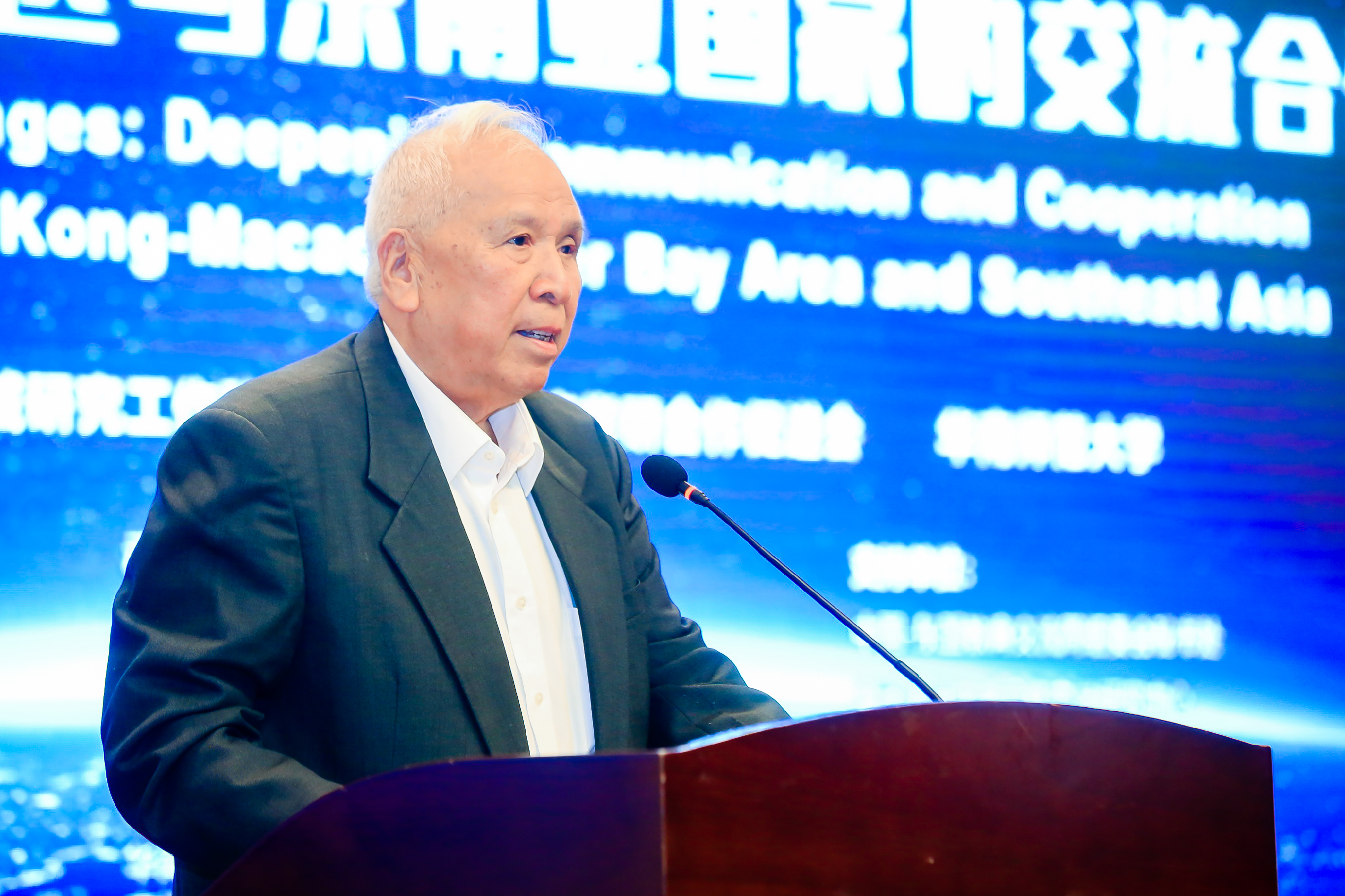
Chen Kaizhi, president of the Guangdong International Culture Exchange Center, gives a speech.
According to Liu Jin, director general of the Department of International Cooperation and Exchange of the Ministry of Education (MOE), the government will fully support the Great Bay Area to boost the local area and connect with the world. In a bid for an educational collaboration network of larger size, wider field and higher level, we should give full play to the advantages of exchange platforms like the “Southeast Asia Forum”, improve the regional education exchange system and set up more projects reflecting regional advantages and local characteristics.
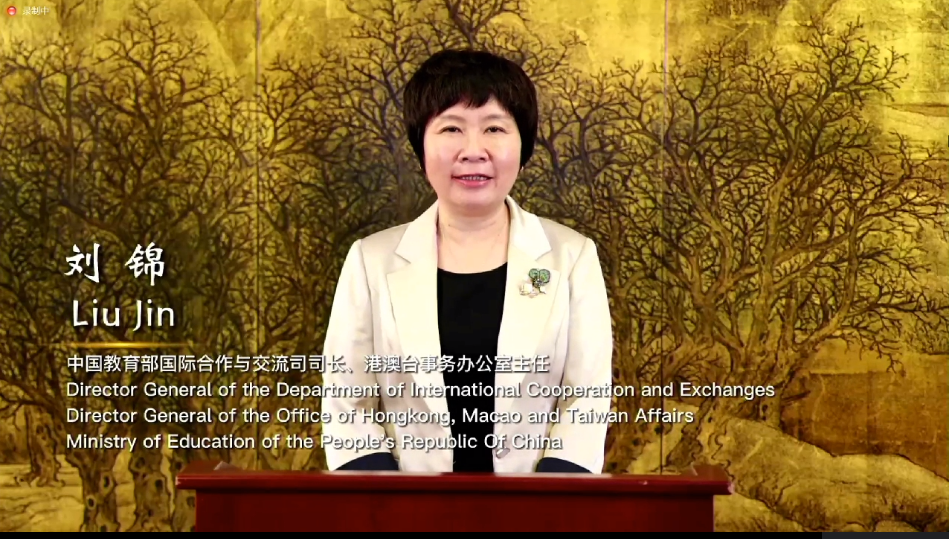
Liu Jin, director general of the Department of International Cooperation and Exchange of the MOE, delivers a speech.
Ma Jianfei, director of Center for Language Education and Cooperation said SCNU plays a vital role in international Chinese education, and the International Chinese Language Teachers’ Training School of SCNU puts increasing emphasis on carrying out research in this field and promoting Chinese teacher training and high-end professional talents training in the southeast Asian region.
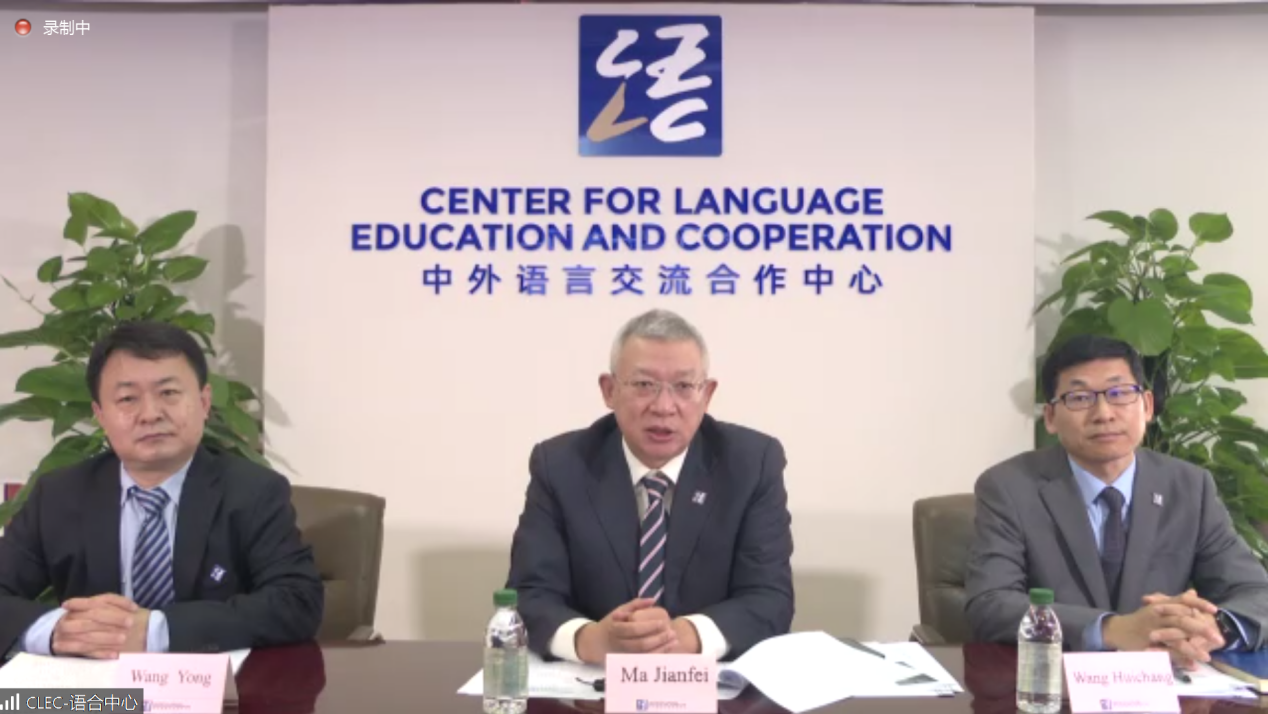
Ma Jianfei, director of Center for Language Education and Cooperation gives a speech.
Professor Zhai Kun, associate dean of the Institute of Area Studies of Peking University, said that since its establishment, the Center for Southeast Asian Studies of SCNU has gradually developed the feature of “Pedagogy plus southeast Asian studies” focusing on countries and local area studies. Next year, SCNU will welcome the first batch of students majoring in interdisciplinary “Southeast Asian Studies”. The establishment of this major is the result of China's innovative practice of setting up country / area studies within Southeast Asian studies, and will provide valuable experience for the development of the discipline.
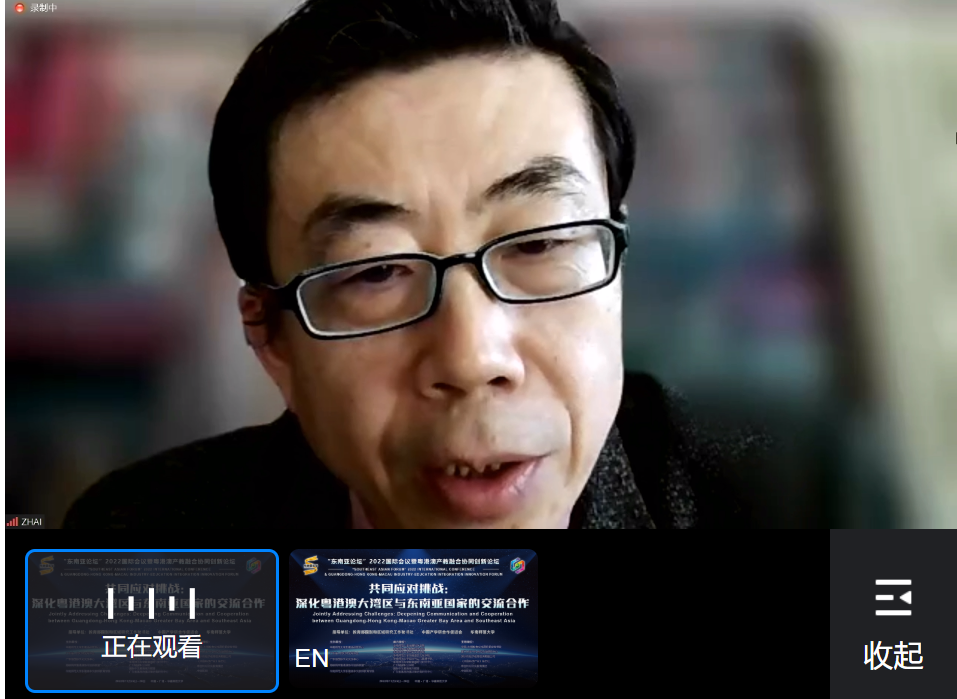
Zhai Kun, associate dean of the Institute of Area Studies of Peking University, addresses the forum via video link.
Korn Dabbaransi, the president of the Thai-Chinese Relations Association and consultant of the Center for Southeast Asian Studies of SCNU, and Chhem Kieth Rethy, consultant of the Cambodia Development Resource Institute and visiting professor at SCNU, also sent a congratulatory letter on the opening ceremony. They hoped that the forum would contribute to the exchange of views, the strengthening of cooperation, and the promotion of mutual development and prosperity.
The keynote report was divided into three parts. Experts and scholars from Beijing, Guangdong, Yunnan, Sichuan, Jiangxi, Hong Kong, Macao, Taiwan, and 11 countries and regions in southeast Asia made keynote speeches on deepening cooperation between China and ASEAN, strengthening the training of southeast Asian research talents, carrying out international Chinese education and promoting the development of Chinese business communities and etc.
In addition, the forum set up three sub-forums, namely (1) “the Greater Bay Area and Southeast Asia under global change: economic and trade recovery and coordinated development”, (2) “the Greater Bay Area and southeast Asia from the perspective of multilateralism: scientific and technological innovation and achievement sharing” and (3) “Reshaping the ‘Chinese and Professional’ Talent Cultivation System for a Sustainable Future: knowledge generation and practice route”.
The annual International Conference of the Southeast Asia Forum has been hosted for six years consecutively and has become an important platform to promote professional research, exchange and cooperation between countries and regions. The development of the Southeast Asia Research Platform of SCNU has resulted in the preliminary formation of a development system which consist of one institute (the International Chinese Language Teachers’ Training School of SCNU), one discipline (the interdisciplinary "Southeast Asian Studies"), one research platform (the Center for Southeast Asian Studies), one academy (the International Chinese Education Southern Union), and one journal (Southeast Asian Studies). This development will strengthen the general leading effect of the preponderant research field.
Several series of diplomatic activities were held in the southeast Asian region in 2022, namely the ASEAN Post-Ministerial Conference (PMC) 10+1 Sessions, the 25th ASEAN+3 (Japan-China-Republic of Korea) Summit, the East Asia Summit, the G20 conference, and the APEC leaders' informal leader’s meeting, etc. The “Southeast Asia Forum” provides a more solid foundation, for more precise thought and more pragmatic solutions to deepen the cooperation between China and ASEAN countries.
Source: SCNU News Center
Translated by Shen Jiatong, Liu Yujia, Long Yuchen
Proofread by Edwin Baak
Edited by Li Jianru
What to read next:


